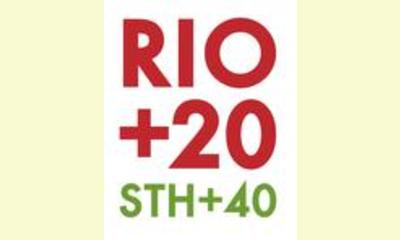|
|
The World Social Forum prepares for Rio + 20
un articulo por David Adams
The coming year will be the 20th anniversary of the United Nations Conference on Environment and Development that took place in Rio de Janeiro and the 40th anniversary of the Stockholm Conference, which were turning points in the world's consciousness that our present methods of development are destroying the environment of planet earth. The United Nations plans an inter-governmental conference to take place in Brazil on 20-22 June 2012 to secure renewed political commitment to sustainable development by Member States of the UN.

click on photo to enlarge
Meanwhile the civil society is mobilizing to contribute to the process of consciousness raising around Rio + 20. There are numerous initiatives, but of special importance is the initiative of the World Social Forum. As readers of CPNN know from previous articles, the World Social Forum, which originated in Brazil, has provided a radical, civil-society alternative to the World Economic Forum which involves many of the world's richest and most powerful capitalists.
The approach of World Social Forum is evolving through Thematic Social Forums, as explained as follows in a recent online forum by Cândido Grzybowski, a veteran organizer of the World Social Forums (WSF).
"The Thematic Social Forums . . . engage the organized citizenship in order to go deeply into the theme and draw up proposals, including topics like security and food sovereignty, migrants, water as a common asset, women. We are witnessing a WSF innovative approach, among the major international events, with considerable potential . . . The possibility of organizing the Thematic Social Forum on the environment and development, in January of 2012, in Porto Alegre, with a view to the Rio + 20 UN Conferences, is a great opportunity to try out the ways to define the common operation conditions of the thematic forums in line with the WSF."
Grzybowski said that social movements should organise a strong presence at the 2012 conference, to forge an alliance with the Brazilian government with a view to changing the way the environment and development are thought about. He said that the Rio + 20 events can serve to further develop the process of the World Social Forum and that the civil society of Brazil can play a leading role: "The challenge of performing such a task and hence of stimulating the WSF as a process is in our reach, and in the reach of the Brazilian social organizations and movements, without missing the main focus on Rio + 20."
Once again, the people of Brazil are playing a leading role in the transition to a culture of peace.
|








|
DISCUSSION
Pregunta(s) relacionada(s) al artículo :
Despite the vested interests of companies and governments, Can we make progress toward sustainable development?
* * * * *
Comentario más reciente:
:
[responding to CPNN article The film 'Demain', a manifesto?
Yes initiatives from the grassroots are important and necessary which will have a direct impact on the present and the future. But there are governments like India which are conscious of over exploitation of the earth’s resources and are taking suitable policy measures and also taking legal action against the exploiters.
We must emphasize public transportation and reduce our dependence on individual cars even though the auto industry will not like this.
Otherwise it is not demain but aujourdhui — the problems are there for us to see.

|
|








